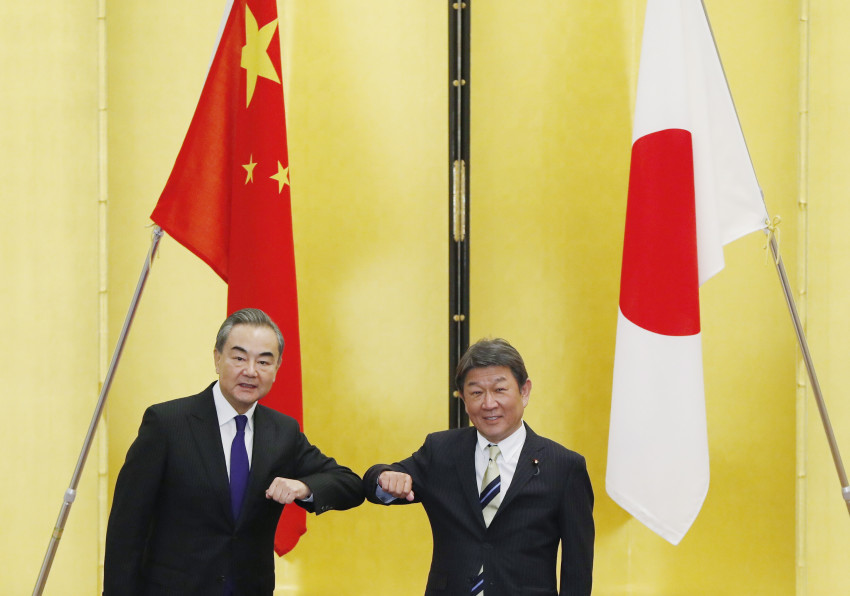 China's foreign minister, Wang Yi (L), and his Japanese counterpart, Toshimitsu Motegi (R). (Image via Japan Today)
China's foreign minister, Wang Yi (L), and his Japanese counterpart, Toshimitsu Motegi (R). (Image via Japan Today)
China, Japan agree to work together against COVID-19
On Tuesday, the foreign minister of Japan, Toshimitsu Motegi, and his counterpart from China, Wang Yi, agreed to fight the novel coronavirus disease (COVID-19) pandemic and restore their economies, while struggling to avoid tensions over the disputed islets in the East China Sea. Previously, Wang arrived in Tokyo on Tuesday amid the concern over China's growing assertiveness in the region. Motegi stated that the cooperation between Japan and China is essential not only for both countries but also for the Asia - Pacific region.
Motegi stated that both China and Japan agreed to proceed with the business travel between them through a so-called "business track" program, allowing visitors to hold limited activities during their 14-day quarantine period. Japan has recently launched a similar program with its other partners such as Singapore, S. Korea, and Vietnam. The world's second and third-largest economies will implement the program by the end of November.
The agreement came as Japan is struggling with the reemergence of the COVID-19 infections as its government is trying to do the balancing act, tackling the pandemic and restoring its economy health simultaneously.
Furthermore, Japan and China also agreed to discuss climate change, energy conservation, healthcare, and e-commerce as part of their economic cooperation. Wang confirmed that both countries agreed to a rule-based multinational trade system.
The key point is that their discussion on the East China Sea islets which Japan calls Senkaku and China calls Diaoyu. Motegi and Wang reportedly agreed to ease the tensions by establishing a hotline between Japan and China's military before 2021 to improve communication and safety. However, both Japan and China still insisted on their stances that no one is willing to back down from the East China Sea.
Meanwhile, it is known that the Chinese visitor topped the number of visitors in Japan. However, the bilateral relations between the neighbouring countries were strained by the territorial dispute and wartime history. Fortunately, the ties improved ever since the trade dispute between China and the United States (U.S) escalated. However, for Japan, it means dilemma, as it sees China as a crucial trading partner yet it wants to maintain its relationship with the U.S.
On Wednesday, Wang is scheduled to meet the Prime Minister (PM) of Japan, Yoshihide Suga, the first meeting between China official and the Japanese leader since the February visit of China's chief of the foreign policy, Yang Jiechi.
Last week, the PM of Australia, Scott Morrison, also talked with Suga and agreed to improve their military partnership to promote peace and stability in the Indo-Pacific region, facing the growing assertiveness of China. That said, Japan, Australia, the U.S, and India, are trying to gather Southeast Asian countries and others to join in their side. Beijing itself criticized the moves.
Supposedly held in Spring 2020, Motegi and Wang did not talk about the rescheduling of the state visit by the President of China, Xi Jinping, whose visit is cancelled due to the pandemic. Wang will depart to S. Korea after Japan.
Source: https://bit.ly/2J67aU1
 English
English Japan
Japan
